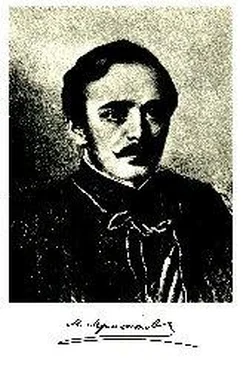His appearance was of the kind that strikes one disagreeably at first sight but subsequently becomes likeable, when the eye has learned to find in the irregular features the imprint of suffering and nobility. There have been cases when women have fallen madly in love with men like him and would not have exchanged their ugliness for the beauty of the freshest and pinkest of Endymions [89] handsome young man loved by Aphrodite in Greek legend.
. Women must be given credit for possessing an instinct for spiritual beauty. Perhaps that is why men like Werner love women so passionately.
Werner was short, thin, and as frail as a child. Like Byron, he had one leg shorter than the other. His head was disproportionately large. He wore his hair cut very short, and the irregularities of his skull thus exposed would have astounded a phrenologist by their queer combination of contradictory inclinations. His small, black, ever restless eyes probed your thoughts. He dressed immaculately and with good taste, and his lean, small, sinewy hands were neatly gloved in pale yellow. His coat, necktie and vest were invariably black. The young set called him Mephistopheles, and though he pretended to be displeased by the name, in reality it flattered his vanity. We soon understood each other and became companions-for I am incapable of friendship. Between two friends one is always the slave of the other, though frequently neither will admit it-the slave I cannot be, and to dominate is an hard job since one has to use deception as well. Besides, I have the servants and the money! This is how we became acquainted: I met Werner in the town of S-, at a large and boisterous gathering of the young set. Toward the end of the evening the conversation took a philosophical and metaphysical turn. We spoke about convictions, of which each had his own.
"As for me, I am convinced of only one thing …" said the doctor.
"And what is that?" I asked, wishing to hear the opinion of a man who had been silent till then.
"That some fine morning, sooner or later, I will die," he replied.
"I am better off than you," said I. "I have another conviction besides, which is that one exceedingly foul night I had the misfortune to be born."
Everyone else was of the opinion that we were talking nonsense, but really nobody had anything more clever to say. From that moment we singled each other out from among the crowd. We used to meet frequently and discuss abstract matters in all seriousness until we both noticed that we were pulling each other's leg. Then, after looking each other in the eye significantly-the way Cicero [90] a stock allusion to an old report that the Roman fortune-tellers who worked by examining animals' guts used to laugh in secret reference to their play-acting of predictions whenever two of them met.
tells us the Roman augurs did - we would burst out laughing and leave separately, satisfied with an evening well spent.
I was lying on a couch, my eyes fixed upon the ceiling and my hands behind my head, when Werner walked into my room. He sat down in a chair, stood his cane in a corner, yawned and observed that it was getting hot outdoors. I replied that the flies were bothering me, and we both fell silent.
"You will have noticed, my dear doctor," said I, "that without fools the world would be very boring... Now here we are, two intelligent people. We know in advance that it's possible to argue about everything endlessly, and so we don't argue. We each know nearly all the other's innermost thoughts. A single word tells us a whole story, and we see the kernel of each of our thoughts through a triple husk: Sad things strike us as funny, funny things as sad, and generally speaking, if you want to know, we are rather indifferent to everything except ourselves. Hence there can be no exchange of emotions and ideas between us. We know all we want to know about each other and don't wish to know more [91] this whole speech is one of the most revealing of Pechorin's character, according to psychoanalytic critics, who point out the obvious determination by Pechorin to hide as much of his true character as possible at the same time he claims that all is known.
. That leaves only one thing to talk about: the latest news. Haven't you any news to tell me?"
Tired by the long speech, I closed my eyes and yawned.
"There is one idea in the trash you are talking," he replied after a pause for thought.
"Two!" I replied.
"Tell me one of them and I will say what the other is."
"Good. You begin," said I, continuing to inspect the ceiling and smiling inwardly.
"You would like to know some details about someone who has arrived at the spa, and I can guess who it is you have in mind because that person has already been inquiring about you.
"Doctor! We definitely don't need to converse; we can read each other's minds."
"Now the other one..."
"The second idea is this: I'd like to induce you to tell me something; firstly, because listening is less tiring than talking, secondly, because in listening one doesn't give anything away, thirdly, because you may learn another man's secret, and, fourthly, because clever people like you prefer a listener to a talker. Now let's come to the point: what did Princess Ligovskaya have to say to you about me?"
"Are you sure it was not Princess Mary?"
"Quite certain."
"Why?"
"Because Princess Mary asked about Grushnitsky."
"You possess a rare sagacity. The young princess said she was certain that this young man in the ordinary soldier's overcoat has been degraded to the ranks on account of a duel …"
"I hope you didn't disabuse her of that pleasant illusion..."
"Naturally not."
"The plot thickens," I cried in elation, "and we'll see to the dйnouement of the comedy. Fate apparently doesn't wish me to be bored."
"I have a notion that poor Grushnitsky will end up as your victim," said the doctor.
"And then what happened, doctor?"
"Princess Ligovskaya said your face was familiar. I observed that she must have met you somewhere in Petersburg society, and mentioned your name. She knew about you. It seems that your story made a sensation there. Then the princess went on to recount your adventures, probably spicing the society gossip with her own opinions. Her daughter listened with interest, visualizing you as the hero of a novel written in the modern style. I didn't contradict the princess though I knew she was talking nonsense.
"Worthy friend!" said I, extending my hand to him. The doctor gripped it with feeling and continued.
"If you wish me to, I'll introduce you..."
"My dear fellow!" said I, spreading my hands. "Have you ever heard of heroes being formally presented? They make the acquaintance of their beloved by rescuing her from certain death…"
"Do you really intend to court Princess Mary?"
"Not at all, quite the contrary! Doctor, I score at last, for you don't understand me! Yet it's rather annoying just the same," I continued after a moment's silence. "I make it a rule never to disclose my own plans, and I'm very glad when others speculate about them, because that leaves me a loophole for denying them when necessary. But you must describe mama and daughter to me. What sort of people are they?"
"In the first place, Princess Ligovskaya is a woman of forty-five," replied Werner. "She has a splendid digestion, and a blood disorder-you can tell by the red spots on her cheeks. The latter half of her life she's spent in Moscow, where inactivity has caused her to put on weight. She likes spicy anecdotes and says improper things when her daughter is out of the room. She told me that her daughter was as innocent as a dove-though what it had to do with me, I don't know. I wanted to tell her that she might rest assured, I would tell no one about it! The princess is taking the cure for rheumatism, and the daughter the Lord knows what for. I told them both to drink two glasses of sulfur water daily and bathe twice weekly in it. The old princess apparently is not used to ordering people about, and she respects the brains and knowledge of her daughter, who has read Byron in English and knows algebra, for it seems that the young ladies of Moscow have taken up learning-good for them, I would say. In general our men have such bad manners that intelligent women probably find it unbearable to flirt with them. The elder princess is very fond of young men, but Princess Mary regards them with a certain contempt-an old Moscow habit. In Moscow they go in for forty-year-old wits only."
Читать дальше

![Михаил Лермонтов - A Hero of Our Time [New Translation]](/books/27671/mihail-lermontov-a-hero-of-our-time-new-translati-thumb.webp)










